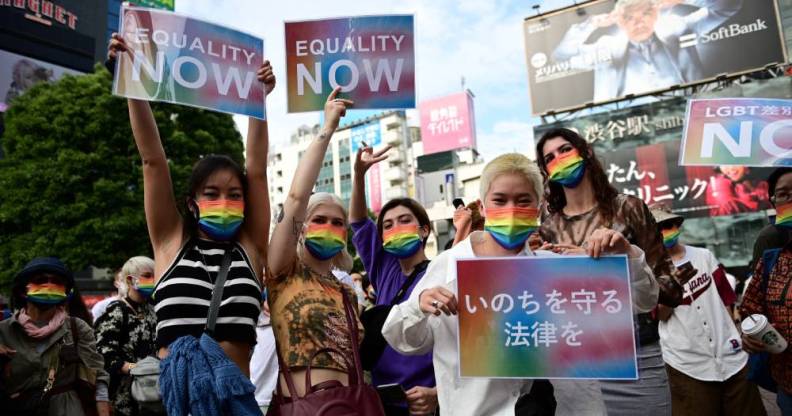Japan’s new prime minister could herald a ‘historic moment’ for LGBT+ rights

People take part in a rally organised by an activist group to support the LGBT legislation in Shibuya district of Tokyo on 6 June 2021. (Philip Fong/AFP)
Japan is about to get a new prime minister – and two candidates in particular have the potential to transform LGBT+ rights, including same-sex marriage.
After the current Japanese prime minister Yoshihide Suga decided to step down a year into his term, his Liberal Democratic Party (LDP) is set to choose a successor on Wednesday (29 September).
The election is a “historic moment” for Japan – not just because two of the four candidates are women, but also because two candidates support same-sex marriage.
Alexander Dmitrenko is a co-founder and co-chair of Lawyers for LGBT & Allies Network (LLAN) and a counsel at Freshfields Bruckhaus Deringer in Tokyo. He told PinkNews that the current “frontrunners” for the election are Fumio Kishida, former foreign minister, and Taro Kono, the cabinet minister in charge of vaccinations.
Kono’s was the first voice from within the LDP in support of same-sex marriage, Dmitrenko explained, and a “fairly important” one at that.
Even before the leadership race, Kono made headlines in Japan after he said: “I will support marriage equality.”
“The LDP is not the most progressive of parties, but it has a very diverse membership,” Dmitrenko told PinkNews. “For Kono to come out during the leadership race and to express support for marriage equality is, to my mind, very leadership like.”
He said that Kono is a “very viable candidate” with “a lot of junior members of the party supporting him”, and that he is “very well-liked” within Japanese society.
Sanae Takaichi and Seiko Noda are the first women in over a decade to seek leadership of the LDP.
Noda has said that she supports same-sex marriage and in a recent campaign speech, she said that she wants to see more LGBT+ people “take centre stage” in society.
“I seek to create a society of diversity by having people who have not been given main roles in society, including children, women, the disabled and LGBTQ people, take centre stage,” Noda explained, according to ABC News.

Candidates for the presidential election of the ruling LDP pose prior to a debate on 18 September 2021 in Tokyo. The contenders (L-R) are Taro Kono, Fumio Kishida, Sanae Takaichi and Seiko Noda (AP Photo/Eugene Hoshiko/Pool/Anadolu Agency via Getty)
However, Dmitrenko told PinkNews that Noda is probably the “least favourite to win” as other candidates, like Kono, have more backing within the party.
According to Dmitrenko, Takaichi has not come out openly opposing same-sex marriage but instead reiterated that the “current status of the law of the land” is that LGBT+ can’t marry.
“And that was the answer which isn’t really an answer.”
Party members will vote for the new leader and prime minister, and polling has been favouring former foreign minister Kishida.
Dmitrenko said that Kishida “hasn’t made up his mind” on same-sex marriage, saying he would “prefer to hear various opinions on the issue”.
Currently, Japan’s constitution defines marriage as based on the “mutual consent of both sexes”.
But in a landmark ruling earlier this year, a district court in the Sapporo district said that blocking same-sex marriage is “unconstitutional”.
The judgement, however, was seen as largely symbolic.

Tokyo’s Rainbow Pride parade, April 2019. (Alessandro Di Ciommo/NurPhoto via Getty)
Compared to many other Asian countries, Japan is relatively progressive when it comes to LGBT+ rights, with homosexuality being legal since 1880. But there are currently no laws preventing discrimination of LGBT+ people in the workplace or housing, and anti-LGBT prejudice is still rife in the country.
Over a hundred leading human rights and LGBT+ organisations called on the Japanese government to introduce a law to protect LGBT+ people from discrimination on the basis of sexual orientation and gender identity ahead of the Olympic games.
However, their pleas were left unanswered, and no such legislation has yet to be introduced.
Akira Nishiyama, executive officer of the Japan Alliance for LGBT Legislation (J-ALL), an umbrella organisation of 80 LGBT+ groups in Japan, said that in order to Japan to tackle anti-LGBT+ discrimination, the next prime minister must “take a lead” and legislate.

